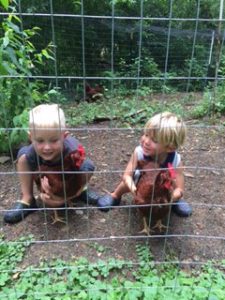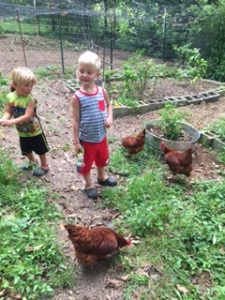Featured Farmer:
Matthew Mays from Pittsburgh, PA
Editor’s note: Matthew sent this information in an email to me in March, and I was so impressed that I had to ask him if he’d be willing to be a featured farmer! I hope his story inspires you as much as it does me.
 Here is a quick overview of me, my family and our slice of Suburban Homesteading paradise.
Here is a quick overview of me, my family and our slice of Suburban Homesteading paradise.
I’m a Police Officer holding the rank of Sergeant, my wife is a Respiratory Therapist and we have 2 children (ages 4 and 2). We live in a suburb about 12 miles north of Pittsburgh, PA. We moved to our current home last April and have done a massive amount of work both indoors and outdoors. I feel that living in the suburbs makes homesteading a little more challenging. While we own over an acre of ground and have access to public water and utilities we are also tasked with keeping our property neat and orderly to appease the neighbors and township.
I was born and raised in the city, with no plans of becoming a suburban farmer. My wife was born into a farming family, as her dad is a 6th generation farmer (large scale agribusiness). We both have decided to go against the grain of our upbringing (with total parental support) and partake in organic gardening, free-range egg production and plenty of other homesteading activities.
Our Suburban Homestead at a glance:
We own over an acre of ground, we are currently using approximately 1/3 of that space for homesteading activities. The rest is for kids to run, jump and play. However, as I stated earlier a large portion is also dedicated to keeping the neighbors happy. We still have a lot of grass that is kept neat and mowed as well as numerous flower beds for strictly decorative purposes. As we make improvements we will slowly make the majority of the landscaping edible or as forage for chickens and sources of nutrition for the bees. Property Details:
Property Details:
- 4 Rhode Island Red Hens (free range via a Joel Salatin-style chicken tractor and housed in a large run when necessary and coop at night)
- 3 beehives (kept illegally, plans to expand to 6 after making colony splits and purchase of at least 1 new Nuc colony)
- 1 small pond that we will drain once a year to harvest the muck at the bottom, which is a tremendous source of plant fertilizer
Since we only moved in less than a year ago, a lot of our focus has been on building the soil fertility. We have been composting any and all vegetable matter and biomass. We offer it to the chickens first, then it ends up in the compost piles. We have found a local source of rabbit manure and have been picking up approximately 35-40 gallons of the stuff weekly and spreading it as weather permits. Another big focus of ours has been to provide a large amount of pollinator-friendly plants in our own yard, due to the fact that most of our suburban neighbors have their lawns and trees chemically treated
We are currently using indoor grow lights to start seeds of our cool weather crops that we will transplant in the coming weeks.
We will be starting our summer crops in a little over a month, indoors as well.
We have been experiencing a warm winter, therefore we do have several types of veggies growing outside via cold-frames. We will also be planting numerous types of clover, field legumes and cover crops as sources of forage for chickens, nutrition for the bees and eventually as biomass for compost.
We will also be planting numerous types of clover, field legumes and cover crops as sources of forage for chickens, nutrition for the bees and eventually as biomass for compost.
We make our own raw kefir from locally-sourced raw milk.
My wife makes her own bread from locally sourced flours, seeds and grains. She makes her own jams from local fruit (this will change as our berry bushes and fruit trees begin producing).
We purchase all of our meat from a local farmer (grass-fed Beef, Woodland Pork and free-range, pastured chickens). The rest of our meat consumption comes from wild-game sourced via bow-hunting.
Any veggies/fruit not consumed fresh is preserved through canning or freezing. We had my wife’s 90-year-old grandma stayed with us for several days to teach us her skills!
Our future plans are to continue building the soil and expand our vegetable growing space to allow us to grow for market. I also am planning to run for town council in order to change our archaic laws on keeping chickens and bees!
SaveSave








Whew! You and family are going at the farming life with admirable industry. I have had the good fortune to live in small cities where urban farming had a more welcoming reception. Michael Jordan,a fairly well known urban beekeeper in Wyoming recently commented that his City Vultu…I mean Fathers were very frustrated because though much of what Michael is doing on his bee farm is restricted by ordinances the officials can’t take action because Michael is feeding his neighborhood organic veggies and honey treats from his little city lot, and nobody would dream of cutting off the supply by filing any complaints. The flower borders are a great idea as a neighborhood pacifier. Have you thought about combining calming, soothing and uplifting or bee-therapeutic herbs with similarly endowed flowers and gradually converting to low maintenance edible perennials as a maintenance reducer? At minimum, it’s more compost material. At optimum, you would have camouflage and a disarming, charming profile in the neighborhood. Sympathetic constituents!